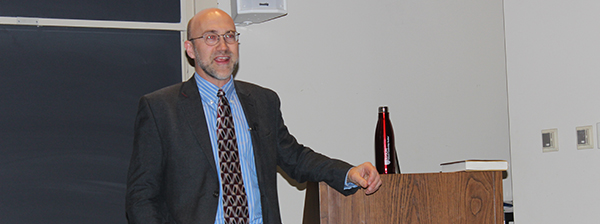
Those who study leadership sometimes measure characteristics in one dimension or another, with little regard for interrelationships among dimensions. In this view, good leaders are bold and visionary, willing to take risks, and socially conscious. Bad leaders are none of these things.
What if leaders are a messy combination of traits that emerge under some circumstances but not others? What if some circumstances call for collaboration, while other situations necessitate firm but even-handed and solitary decision making? This points to observed leadership paradoxes, when leaders act in seemingly contrary ways.
In Andrew R. Murphy’s scholarship, William Penn emerges as one such complex leader, characterized by paradoxes and tensions. Dr. Murphy was the Jepson School’s Richard L. Morrill visiting chair in ethics and democratic values during fall semester 2018. In this role, he led a seminar for interested faculty from the School of Law, the Jepson School of Leadership Studies, the School of Arts and Sciences, and the School of Professional and Continuing Studies on the intersection of religious and political thought historically and today.
On Nov. 30, he gave a Marshall Center Lecture Series presentation highlighting his research about Penn. In Dr. Murphy’s account, Penn is one of those leaders whose name is familiar to all, but about whom few know much.
Paradoxes characterized Penn’s extraordinary, lengthy career. He was educated with all the trappings of the aristocracy, with the expectation he would achieve positions of leadership. Notwithstanding, he eschewed those opportunities as a result of an intense religious experience and conversion to Quakerism. Somehow, he was able to navigate the two very different social and religious worlds of English aristocrats and Quakers. Perhaps it is no wonder that such a life was marked by tensions.
Dr. Murphy focused on several paradoxes in Penn’s leadership. Penn personified the Quaker idea of equality but moved amidst social hierarchy. He held egalitarian principles but expected deference. He defended Parliament but was an adviser to King James. He was an “adopted American” but an absentee landlord. He led the thriving colony of Pennsylvania, while suffering financial difficulties that landed him in debtors’ prison.
In this telling, Penn was marginalized but, nonetheless, a member of the elite. Perhaps he connected with King James because both were outside the norms of mainstream religion.
What enduring lessons emerge from Dr. Murphy’s study of such an interesting exemplar of leadership? Contrary to the quick fix lessons on leadership that pervade the marketplace—try these five steps and you will become a successful leader—success in positions of leadership is hard work. It doesn’t come easily. It comes amidst failure and sometimes at the sacrifice of success in other dimensions, personal or otherwise. Penn’s life reminds us that leaders are people too.
